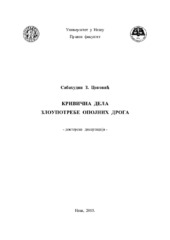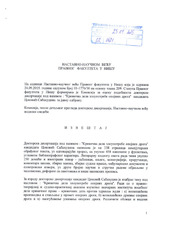Приказ основних података о дисертацији
Krivična dela zloupotrebe opojnih droga
| dc.contributor.advisor | Jovašević, Dragan M. | |
| dc.contributor.other | Petrović, Borislav | |
| dc.contributor.other | Miladinović-Stefanović, Dušica S. | |
| dc.contributor.other | Ćirić, Zoran D. | |
| dc.creator | Coković, Sabahudin Z. | |
| dc.date.accessioned | 2016-07-23T16:20:47Z | |
| dc.date.available | 2016-07-23T16:20:47Z | |
| dc.date.available | 2020-07-03T16:10:16Z | |
| dc.date.issued | 2015-12-12 | |
| dc.identifier.uri | https://nardus.mpn.gov.rs/handle/123456789/6047 | |
| dc.identifier.uri | http://eteze.ni.ac.rs/application/showtheses?thesesId=3356 | |
| dc.identifier.uri | https://fedorani.ni.ac.rs/fedora/get/o:1101/bdef:Content/download | |
| dc.identifier.uri | http://vbs.rs/scripts/cobiss?command=DISPLAY&base=70052&RID=1026286241 | |
| dc.description.abstract | The offenses which criminalize various forms of narcotic drug abuse are not only present in contemporary legislation, but have existed for many years. Namely, in order to be able to fully understand why and how certain acts of narcotic drug abuse became incriminating and introduced into the modern (positive) legislation, it is necessary to become familiar with this negative social phenomenon and its criminalization through its historical emergence and development. Thus, the first phase of our research applied a legal – historical method which investigated the tendency of drug abuse criminalization development at the international level in terms of the adoption of international conventions in this field, as well as the tendencies of its development in the Republic of Serbia criminal legislation. In the second phase of the research a comparative - legal method was applied, through which we gathered significant insights and conclusions about the narcotic drug abuse criminalization. In addition to other findings, by applying this method the author came to realize that among a number of substantive criminal legislations there were special laws that criminalize the offenses of narcotic drug abuse. For example, this occurrence can be seen in Germany, Switzerland, Sweden, Luxembourg, Saudi Arabia and so on. On the other hand, there are criminal legislations, ours being one of them, which are characterized by the fact that the narcotic drug abuse is criminalized by Criminal Codes. Such occurrence can, for example, be seen in France, Turkey, Russia, Belarus, Kazakhstan, China, etc. Also, it has been concluded that many countries, including the Republic of Serbia, have based their criminal substantive legislation, at least concerning the offenses related to the narcotic drug abuse, on the provisions of the Single Convention on Narcotic Drugs of 1961, the Convention on Psychotropic Substances of 1971, the Protocol amending the Single Convention on Narcotic Drugs of 1972 and the UN Convention against Illicit Traffic in Narcotic Drugs and Psychotropic Substances of 1988. The next phase included the implementation of a positive method. By applying this method, we performed a detailed analysis of the current (positive) substantive legislation of the Republic of Serbia and other regulations and acts pertaining to the narcotic drug abuse criminalization. Accordingly, we analyzed the concept, the subject of protection, the subject of perpetration, acts of commission, the consequences, the form of guilt, the capacity of the offender, the forms of perpetration and the prescribed penalties for the following offenses: 1) the illicit production and trafficking of narcotic drugs, 2) the illicit possession of narcotic drugs and 3) facilitating the use of narcotics. The application of the positive method was followed by a phase of implementation or utilization of the content analysis method. Through this method, the contents of various legal sources important for the criminalization of the narcotic drug abuse were analyzed. Also, this method analyzed the judicial practice (court decisions) in relation to the offenses of narcotic drug abuse, which ought to have given us a portrayal of the applicability of the provisions of Articles 246, 246–а. and 247. of the Criminal Code of the Republic of Serbia, during criminal proceedings, especially in Magistrate and Higher courts. The final phase was the implementation of the statistical method in judicial practice. The research covered the period from 2006. to 2013. where we analyzed the applicability of the provisions of Articles 246, 246–а. and 247. of the Criminal Code of the Republic of Serbia in judicial practice of the Republic of Serbia and locally, in the town of Novi Pazar. | en |
| dc.format | application/pdf | |
| dc.language | sr | |
| dc.publisher | Универзитет у Нишу, Правни факултет | sr |
| dc.rights | openAccess | en |
| dc.rights.uri | https://creativecommons.org/licenses/by-nc-nd/4.0/ | |
| dc.source | Универзитет у Нишу | sr |
| dc.subject | krivična dela | sr |
| dc.subject | offences | en |
| dc.subject | neovlašćena proizvodnja | sr |
| dc.subject | promet | sr |
| dc.subject | držanje | sr |
| dc.subject | omogućavanje | sr |
| dc.subject | inkriminacija | sr |
| dc.subject | zloupotreba | sr |
| dc.subject | opojne droge | sr |
| dc.subject | konvencije | sr |
| dc.subject | zakonik | sr |
| dc.subject | illicit production | en |
| dc.subject | circulation | en |
| dc.subject | possession | en |
| dc.subject | enabling | en |
| dc.subject | criminalization | en |
| dc.subject | abuse | en |
| dc.subject | narcotic drugs | en |
| dc.subject | conventions | en |
| dc.subject | code | en |
| dc.title | Krivična dela zloupotrebe opojnih droga | sr |
| dc.type | doctoralThesis | en |
| dc.rights.license | BY-NC-ND | |
| dcterms.abstract | Јовашевић, Драган М.; Ћирић, Зоран Д.; Петровић, Борислав; Миладиновић-Стефановић, Душица С.; Цоковић, Сабахудин З.; Кривична дела злоупотребе опојних дрога; Кривична дела злоупотребе опојних дрога; | |
| dc.identifier.fulltext | https://nardus.mpn.gov.rs/bitstream/id/53848/Disertacija3988.pdf | |
| dc.identifier.fulltext | https://nardus.mpn.gov.rs/bitstream/id/53849/Cokovic_Sabahudin_Z.pdf | |
| dc.identifier.fulltext | http://nardus.mpn.gov.rs/bitstream/id/53848/Disertacija3988.pdf | |
| dc.identifier.fulltext | http://nardus.mpn.gov.rs/bitstream/id/53849/Cokovic_Sabahudin_Z.pdf | |
| dc.identifier.rcub | https://hdl.handle.net/21.15107/rcub_nardus_6047 |



